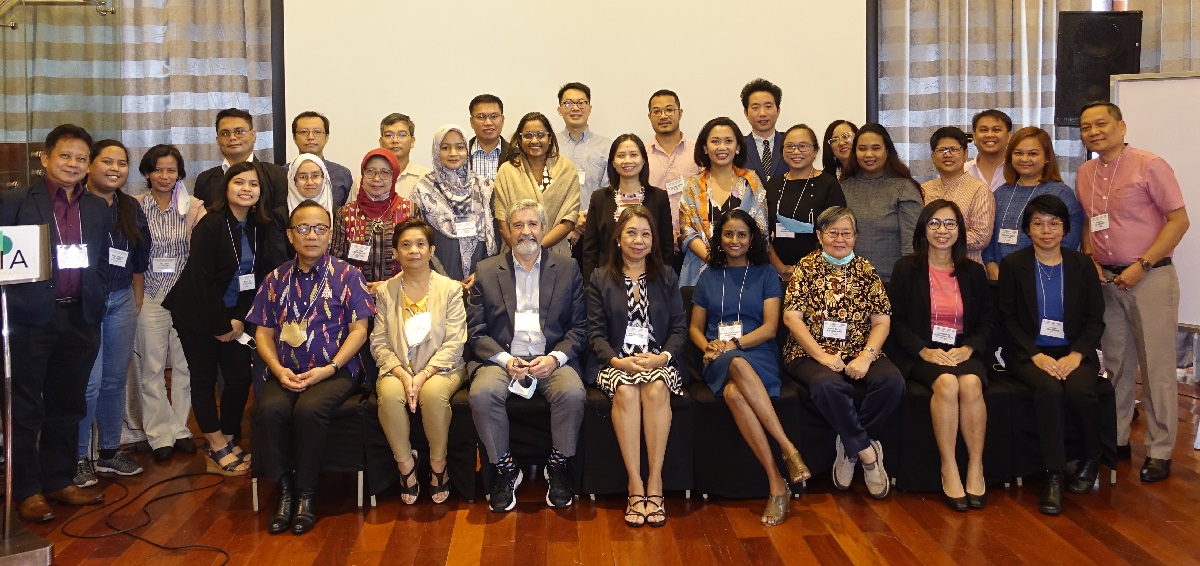
SEAsian Representatives to COP15-MOP10 Briefed on CBD Updates and Negotiations
November 16, 2022| |
ISAAA Inc. together with BioTrust Global, Malaysian Biotechnology Information Center (MABIC), Public Research and Regulation Initiative (PRRI), and the United States Department of Agriculture (USDA) conducted the workshop Asian Regional Workshop on Current and Emerging Topics under the CBD and its Protocols from November 8 to 9, 2022 in Manila, Philippines. The activity intended to prepare participants for the United Nations Biodiversity Conference (15th meeting of the Conference of the Parties or COP-15 and 10th meeting of the Conference of the Parties serving as the meeting of the Parties to the Cartagena Protocol on Biosafety or COP15-MOP 10) in Montreal, Canada in December 2022.
The participants, comprised of regulators, scientists, policy makers, and academics from the Philippines, Indonesia, Malaysia, Thailand, and Vietnam who plan to participate as an individual representative or are part of a representation in the CBD meetings in Montreal, Canada next month. The workshop was divided into three sessions, namely Crop Improvement Technologies and the CBD and its Protocols, Gene Editing and Its Regulations, and Updates from the CBD.
The two-day workshop began with the opening remarks for COPMOP by Dr. Mahaletchumy Arujanan, ISAAA-BioTrust Global Coordinator and Executive Director of MABIC followed by the overview of the workshop by Dr. Rhodora Romero-Aldemita, ISAAA Inc. Executive Director and Director of the Global Knowledge Center on Crop Biotechnology. Dr. Michael Jones, Professor at Murdoch University and the Foundation Director of the Western Australia State Agricultural Biotechnology Center Australia delivered the first talk for Session I about the evolution of technology in crop improvement. After this, Dr. Arujanan proceeded with an introduction to the CBD and its protocols, their governing bodies, and the Post-2020 Global Biodiversity Framework (GBF) with a special focus on its impact to research and development and trade. To understand the Post-2020 GBF provisions that will impact biotechnology, Dr. Lucia de Souza, Executive Secretary of PRRI, explained to the participants contents of and negotiations for Targets 10, 13, and 17, and DSI, all of which will hopefully be settled in COP15-MOP10. Dr. Leonardo A. Gonzales of the Society Towards Reinforcing Inherent Viability for Enrichment Foundation in the Philippines talked about the socio-economic considerations (SECs) in decision making and also provided updates on the discussions related to SECs under COP15-MOP10. Session I ended with the last presentation from Dr. Arujanan on the key biotechnology/biosafety related items on the COP15-MOP10 agenda.
Session II focused on gene editing and its regulations, and Dr. Gabriel O. Romero, Executive Director of the Philippine Seed Industry Association opened the session with a discussion on the applications of gene editing on agriculture and other relevant industries. A presentation on new breeding techniques, genome editing included, and the regulatory considerations involved were discussed by Ms. Ma. Lorelie U. Agbagala, Head Secretariat of the National Committee on Biosafety of the Philippines under the Department of Science and Technology. Dr. Jones presented the status of the regulation of genome/gene-edited crops and produce in Asia and Australasia.
The second day started with Session III of the workshop that informed the participants about the updates from the CBD. Mr. Zakir Jaffry, Programme Management Officer on Biosafety Clearing House (BCH) from the CBD Secretariat in Montreal together with Ms. Marianela Araya Quesada, Program Management Officer on Risk Assessment of Living Modified Organisms who joined virtually, provided the annotated agenda, the Post 2020-Global Biodiversity Target particularly Target 17, and BCH. Afterwards, Prof. Piet van der Meer of PRRI discussed the roles of risk assessment and its relation to other key topics like the AIA/simplified procedures, unintended transboundary movement, and liability and redress. From then on, Dr. Arujanan discussed the last two topics about how to prepare for the COP15-MOP10 and for the national incorporation for an enabling biosafety framework.
The workshop was summarized and closed by Dr. Romero-Aldemita. Mr. Panfilo de Guzman, Dr. Romero-Aldemita and Ms. Kristine Grace N. Tome, all from ISAAA Inc., served as moderators for the two-day workshop.
For inquiries, send an email to knowledge.center@isaaa.org.
| |
You might also like:
- ISAAA Spearheads Asian Recapping and Debriefing Workshop on CBD/CPB and COPMOP
- ISAAA and Partners Hold Pre-COPMOP Discussions on Convention on Biological Diversity and Its Protocols
- Science Diplomacy: Science-based Legislations for the Advancement of Research
Biotech Updates is a weekly newsletter of ISAAA, a not-for-profit organization. It is distributed for free to over 22,000 subscribers worldwide to inform them about the key developments in biosciences, especially in biotechnology. Your support will help us in our mission to feed the world with knowledge. You can help by donating as little as $10.
-
See more articles:
-
News from Around the World
- Initiative to Uplift Agrifood Systems Launched in COP27
- Chemists Create Artificial Photosynthesis 10 Times More Efficient than Existing Systems
- SEAsian Representatives to COP15-MOP10 Briefed on CBD Updates and Negotiations
- GRDC and Partners Target to Boost Wheat's Heat Tolerance
- Forum on Philippine Biotech Regulations
- ASCA5 Highlights CBD Updates, Science Diplomacy in Preparation for COP15-MOP10
- EFSA Finds No New Hazards for GM Cotton 281-24-236 × 3006-210-23
- Genetically Modified Houseplant Pothos to Reduce Indoor Air Pollution
-
Research Highlights
- Scientists Identify Wheat Genetically Resistant to Fungus Causing Snow Mold
- NTU Singapore Scientists Genetically Engineer Plants to Increase Oil Content
-
Plant
- Researchers Develop an Optimized CRISPR tool for Tobacco
- Restoring the Red Seed Coat in Rice through Genome Editing
-
Read the latest: - Biotech Updates (February 4, 2026)
- Gene Editing Supplement (January 28, 2026)
- Gene Drive Supplement (February 22, 2023)
-
Subscribe to BU: - Share
- Tweet

